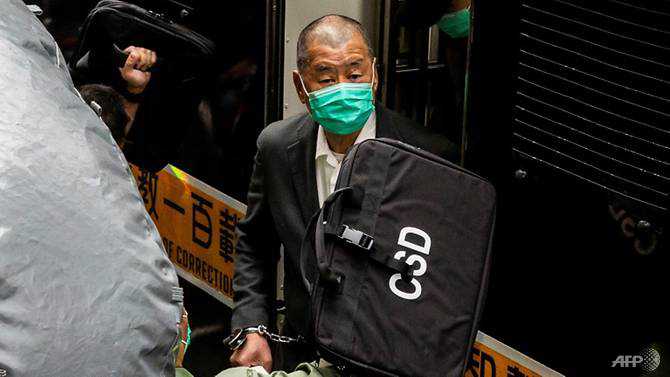Hong Kong's top court denies bail to media tycoon Jimmy Lai
09 February, 2021

Hong Kong's top courtroom on Tuesday (Feb 9) ordered media tycoon Jimmy Lai to stay behind bars as it sided with prosecutors in the initial legal check of Beijing's sweeping latest national security law.
The landmark case cements the dramatic changes the security laws has begun producing to semi-autonomous Hong Kong's common law traditions as Beijing seeks to snuff out dissent in the restless financial hub.
Lai, the 73-year-older owner of pro-democracy tabloid Apple Daily, is one of more than 100 activists arrested beneath the law because it was enacted in June, and the highest-profile physique to be located in pre-trial custody.
He has been charged with "colluding with foreign forces" - among the new security crimes - for allegedly calling for sanctions against Hong Kong and China.
The security law may be the most pronounced shift in Hong Kong's relationship with China because it was handed again by Britain in 1997.
It criminalised a bunch of political opinions and toppled the legal firewall between your two territories.
Written in Beijing and imposed by fiat previous June, it allows mainland secureness agents to operate openly in the location for the very first time, and possibly grants China jurisdiction sometimes.
Tuesday's judgement centred around bail.
Presumption of bail appearing granted for non-violent crimes is a good hallmark of Hong Kong's legal system.
However the national security legislation removes that presumption.
Instead, it states "no bail will be granted to a criminal suspect or defendant unless the judge possesses satisfactory grounds for believing that (they) won't continue to commit functions endangering national security".
LOWER COURT ERROR
Lai was detained in December and released on bail immediately after a lower courtroom granted him HK$10 million (US$1.3 million) bail as well as a stringent set of requirements, including home arrest, no interviews no social media posts.
But he was set back behind bars times following the prosecution sought to task those bail conditions.
On Tuesday, a panel of five senior judges agreed with the prosecution and ruled that the low court judge had erred in granting Lai bail.
The security legislation, the judges wrote, "creates such a specific exception to the overall rule towards the grant of bail and imports a stringent threshold requirement for bail applications".
Legal analysts are closely watching the case for a sign of whether Hong Kong's judiciary will serve - as well as can serve - as any sort of constitutional brake against Beijing's security law.
The judiciary can only interpret regulations, which are often passed by Hong Kong's semi-elected legislature.
During challenges to new legislation, judges balance the wording of a laws against common regulation traditions and key liberties such as for example freedom of speech and presumption of bail that happen to be enshrined in Hong Kong's mini-constitution and its own Bill of Rights.
But the national reliability legislation was penned directly by Beijing and appears place to trump any other legislation in case of a dispute.
In Hong Kong's complex constitutional hierarchy, the ultimate arbiter of the regulations is Beijing's Standing Committee, which includes shown an increased willingness recently to wade into legal arguments and help to make pronouncements.
China's state mass media have previously declared Lai guilty and clarified authorities expect Hong Kong's judges to part with Beijing on national reliability.
Senior Chinese officials have recently supported calls to "reform" Hong Kong's judiciary, something opponents fear signals support for a far more mainland-style legal system that answers to the Communist Party and where convictions are but guaranteed.
Source:
